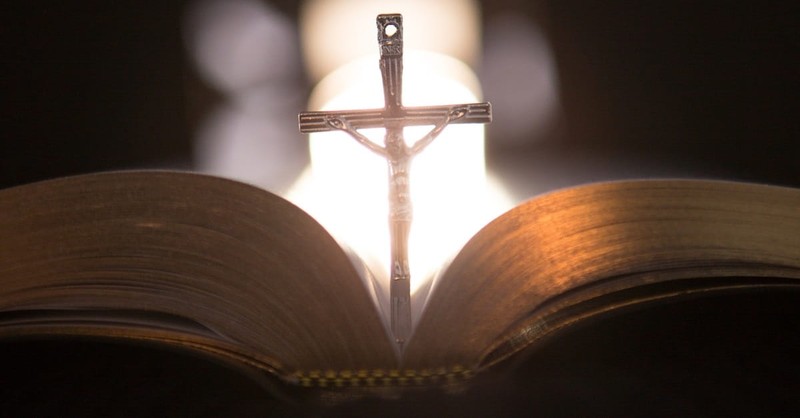
It was more than 500 years ago when the Wittenberg Door was shaken by the ardent resolve of Martin Luther to publicly display the 95 reasons why biblical Christianity stood apart from the religious monopoly the Catholic church had over all Europe. It began with humbly recognizing, “When our Lord and Master Jesus Christ said, ‘Repent’ ( Matthew 4:17 ), he willed the entire life of believers to be one of repentance.” We cannot live life rightly apart from biblical theology, or experientially, without repentance. To take seriously the call of Christ, we must seek the answer: How do we repent well?
Looking back roughly 3,000 years into history we find Psalm 51 giving us a great blueprint for foundational repentance. David had found himself wrapped up in tangles of adultery, theft, and conspiracy to murder. And in the recording of these words we see his heart exposed. Many of the characters in the Bible have left us with precious words that teach, instruct, and encourage, but David’s words always strike with a personal flair. They seem to bleed or dance onto the page. He celebrates, laments, praises, and mourns. He leads us through the spectrum of emotions and teaches us as he goes. David was referred to as a man after God’s own heart, and this shows us what that heart looks like when addressing the problem of sin, and the freedom that repentance can bring.
Photo Credit: Unsplash

1. Rest in the Character of God
“Have mercy on me, O God, according to your unfailing love; according to your great compassion blot out my transgressions” (Psalm 51:1).
As David approaches God with pleas for mercy, he also calls out the characteristics of God he knows he can trust. How much easier it is to approach God when we know Him for who He truly is. We can acknowledge the greatness of His wisdom, love, and compassion as we approach the throne of grace, while also fearing the greatness of His justice, holiness, and glory. A.W. Tozer says in The Knowledge of the Holy that, “The greatness of God rouses fear within us, but His goodness encourages us not to be afraid of Him. To fear and not be afraid - that is the paradox of faith.”
We can repent because God is patient, and did not erase us from existence. We can rest because we know that He has extended mercy to us who have fallen and fail.
Photo credit: Unsplash

2. Know You Cannot Cleanse Yourself
“Wash away all my iniquity and cleanse me from my sin” (Psalm 51:2).
Too often we try to make ourselves clean by whatever means necessary, only to find perpetual frustration in our inability to do so. The best route forward from this point is just to give up on trying to do it on our own and acknowledge that we need the help of a mighty Savior. The book of Titus says it best:
“At one time we too were foolish, disobedient, deceived and enslaved by all kinds of passions and pleasures. We lived in malice and envy, being hated and hating one another. But when the kindness and love of God our Savior appeared, he saved us, not because of righteous things we had done, but because of his mercy. He saved us through the washing of rebirth and renewal by the Holy Spirit, whom he poured out on us generously through Jesus Christ our Savior, so that, having been justified by his grace, we might become heirs having the hope of eternal life” (Titus 3:3-7).
Photo credit: ©Thinkstock

3. Confess Your Sin to God and Others
“For I know my transgressions, and my sin is always before me. Against you, you only, have I sinned and done what is evil in your sight; so you are right in your verdict and justified when you judge” (Psalm 51:3-4).
We must not ignore the preface of this Psalm. It says, “For the director of music. A Psalm of David. When the prophet Nathan came to him after David had committed adultery with Bathsheba.” Nathan was integral in the process of David’s restoration. When David could not bear to see his sin and, like Adam and Eve, tried to hide it, it took another follower of God to speak truth to rescue David from the darkness he dwelt in and into the light of confession.
Sometimes others help to show us our sin; sometimes we need to turn to others for support. James 5:16 reminds us to confess our sin to others under the grace of Christ so we may be supported. This does not mean confess to everybody and their mother, but to find those who are trustworthy and faithful to join you in restoring what has been lost. We see that in the relationship of David and Nathan, but we cannot forget who our sin offends most.
When we turn our backs on God and his ways, it is to God we must confess and seek forgiveness. As much as our sin offends another, it is a greater offense to a holy and righteous God. 1 John 1:9 offers relief to the sinner by reminding that, “If we confess our sins, he is faithful and just and will forgive us our sins and purify us from all unrighteousness.”
Photo credit: Unsplash

4. Return to Righteousness
“Cleanse me with hyssop, and I will be clean; wash me, and I will be whiter than snow. Let me hear joy and gladness; let the bones you have crushed rejoice. Hide your face from my sins and blot out all my iniquity. Create in me a pure heart, O God, and renew a steadfast spirit within me” (Psalm 51:7-10).
While unsettling consequences can lead us to make changes, if we do not look at the sins of our hearts—we will have missed the source of the problem, and have only addressed the symptoms that reminded us what was much deeper within. Are we living in fear because we cannot maintain control? Are we willing to do whatever must be done to possess a desire and finding ourselves destroyed? What are we choosing over God, and what is motivating it? If we want to be cleansed, we must seek God to purify our hearts and renew what has been corrupted.
Photo credit: Unsplash

5. Help Others
“Restore to me the joy of your salvation and grant me a willing spirit, to sustain me. Then I will teach transgressors your ways, so that sinners will turn back to you” (Psalm 51:12-13).
There are so many hurting souls walking the face of the Earth that beyond needing repentance, require regeneration. We have been blessed with the privilege of carrying that good news! When we learn to rejoice in the fact that our souls are saved, we become more willing to trust and obey the God who never leads us astray. Not only that, but we also cannot stay silent about the beauty that is offered through Jesus’ sacrifice. It overflows from us and onto those around us. When you have found the treasure of forgiveness, be willing to share where you found it for it will not run out. It waits for those who seek it.
Photo credit: ©Thinkstock

6. Recognize the Destruction of Sin
“Deliver me from the guilt of bloodshed, O God, you who are God my Savior, and my tongue will sing of your righteousness” (Psalm 51:14).
The transgressions of David are nearly universally seen as wicked, believer or not. You do not take another man’s wife and use your power to place the man whose wife you coveted in a place where his very life will be stolen. We read Jesus’s sermon on the mount in Matthew 5 and find ourselves wondering, “Does hating a man really equal murder, a lustful gaze at someone who is not our spouse, adultery?”
What we need to remember is that sin, once given rule, will destroy and devour anything it can. We cannot say of sin that it is really not that bad. 1 Peter 5:8 warns, “Be alert and of sober mind. Your enemy the devil prowls around like a roaring lion looking for someone to devour.”
The more we mature in our faith, the more we see the absolute depravity of our sins. We no longer make light of the tiny things that draw us away from our savior, because we begin to see that we cannot survive apart from his love. As we grow in the awareness of his presence, it becomes like the air we breathe. It is clear to the devoted follower that if we remain in sin we will surely drown.
Photo credit: ©Thinkstock

7. Offer Thankfulness
“Open my lips, Lord, and my mouth will declare your praise. You do not delight in sacrifice, or I would bring it; you do not take pleasure in burnt offerings. My sacrifice, O God, is a broken spirit; a broken and contrite heart you, God, will not despise” (Psalm 51:15-17).
Our praise should reach the ears of God when we repent, for there would be no forgiveness, no strength to turn from sin if it was not provided by Him. We may dig our pits and latch our chains, but He is the one who lifts us up and sets us free. Our hearts can be poisoned from sin, but heal as we praise the one who lifted the curse of it.
Brennan Manning wrote in Ruthless Trust that, “The foremost quality of a trusting disciple is gratefulness. Gratitude arises from the lived perception, evaluation, and acceptance of all of life is grace—as an undeserved and unearned gift from the father's hand. Such recognition is itself the work of grace, and acceptance of the gift is implicitly an acknowledgment of the Giver.”
May our hearts be ever thankful to Jesus who paid the price we could not pay, and from this time on may we live out his words seen in Matthew 4:17, “Repent, for the kingdom of heaven has come near.”
Chara Donahue is a co-author of the Bible study 1, 2 & 3 John: Experiencing Transformation and is working on her next book. She enjoys serving as a biblical counselor, speaking to women, and savoring coffee when her four kids are out playing with dad. She holds an MSEd from Corban University, is passionate about seeing people set free through God's truths, and is the founder and editor of Anchored Voices. Get in touch with her on Facebook or Twitter.
Photo credit: Unsplash
Originally published Monday, 29 October 2018.







